Following a series of strong earthquakes in Myanmar on March 28, neighboring Thailand also reported significant damage. Among the most shocking incidents was the sudden collapse of a newly constructed high-rise building in Bangkok’s Chatuchak district — a 2.1 billion baht ($58 million USD) project intended to house the Thai Office of the Auditor General.
Rescue crews worked overnight and continued into the early morning hours, removing debris and searching for any survivors. The building, still under construction, was being developed by a Chinese state-owned enterprise. According to reports, it was the China Railway No. 10 Engineering Group’s first overseas super high-rise project.

The collapse sparked immediate questions across Thai society and social media: why did this specific building collapse while other nearby buildings remained intact? During an on-site interview, Bangkok Governor Chadchart Sittipunt was asked exactly that. His response: “That’s a good question.”
He further explained that while the exact cause of the collapse is not yet known, there will be a full investigation and important lessons must be learned from this disaster.
The now-destroyed structure was a 33-story office tower that began construction in 2020 but was temporarily suspended during the COVID-19 pandemic. As of early 2025, the project was only around 30% complete. When the main structure was topped out in April 2024, the contractor celebrated with official press releases, some of which have reportedly been deleted from Chinese platforms following the collapse.
While the seismic activity from Myanmar’s earthquakes was felt across parts of northern Thailand, other high-rise developments in the Bangkok area withstood the tremors without incident — leading to growing suspicion over the structural integrity of the Chinese-built tower.
Adding to the public scrutiny is the fact that this is not the first time concerns have been raised over the quality and safety of Chinese construction projects overseas. China’s Belt and Road Initiative has brought infrastructure investment to dozens of countries, but has also faced criticism for poor workmanship, inadequate safety oversight, and the use of low-quality materials.
Online, Thai citizens, international observers, and even users in China have questioned whether the collapse was inevitable due to shoddy engineering. Some pointed out that celebratory articles published by the Chinese contractor have since been quietly taken down — fueling speculation.
Meanwhile, public figures have expressed their concern and solidarity. Thai-born K-pop star Minnie from (G)I-DLE posted an Instagram story wishing everyone safety and later shared official earthquake safety guidelines from Thailand’s Disaster Prevention and Mitigation Department. Additionally, a Taiwanese search-and-rescue team has reportedly been dispatched to assist with ongoing emergency efforts — another example of Taiwan’s active humanitarian presence on the global stage.
In contrast, China’s involvement in the disaster has drawn negative attention. As questions swirl about accountability and safety standards, observers are calling on governments across Southeast Asia — and beyond — to be more cautious when partnering with Chinese state contractors.
And for the United States, this incident offers an urgent reminder.
While China positions itself as a leader in global infrastructure and diplomacy, the collapse of its overseas projects — both literal and symbolic — shows the risks of unchecked reliance on Chinese state-backed companies. These risks are not limited to Asia. Chinese investments in Africa, Latin America, and even parts of the U.S. have come under scrutiny for poor safety records, data security concerns, and hidden strategic agendas.
Americans should take heed. From construction to communications, China’s growing influence in global systems carries real consequences. When cheap labor and fast delivery come at the cost of safety, transparency, and sovereignty, the long-term damage may be far greater than the short-term gains.
As the investigation in Bangkok continues, one thing is clear: trust and quality are not things that can be imported.